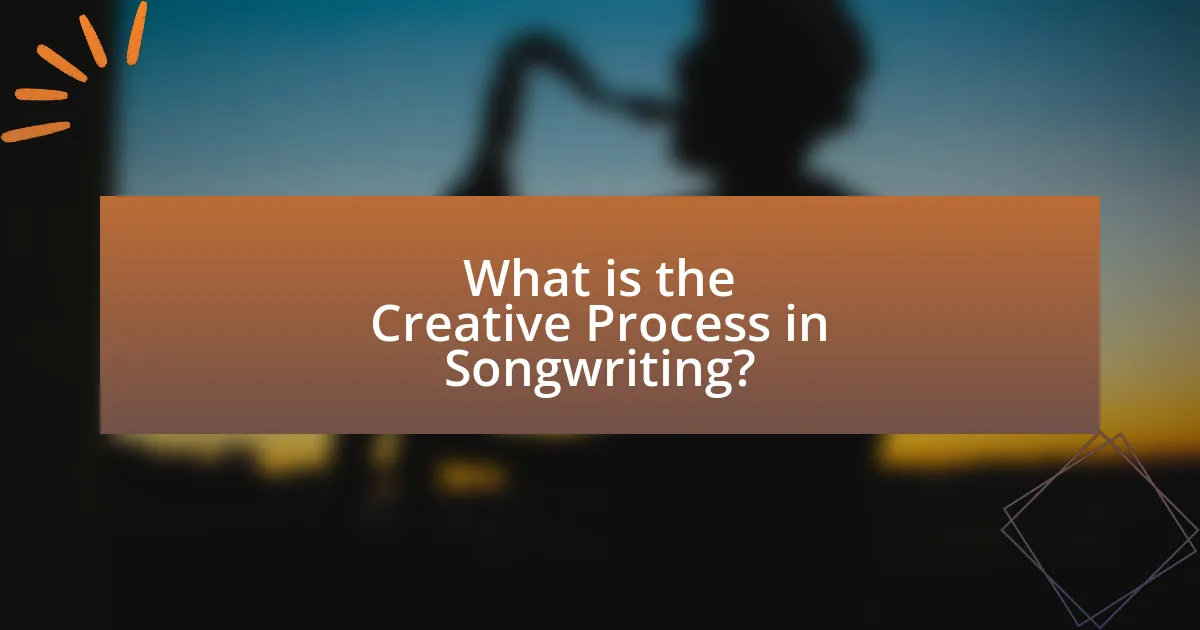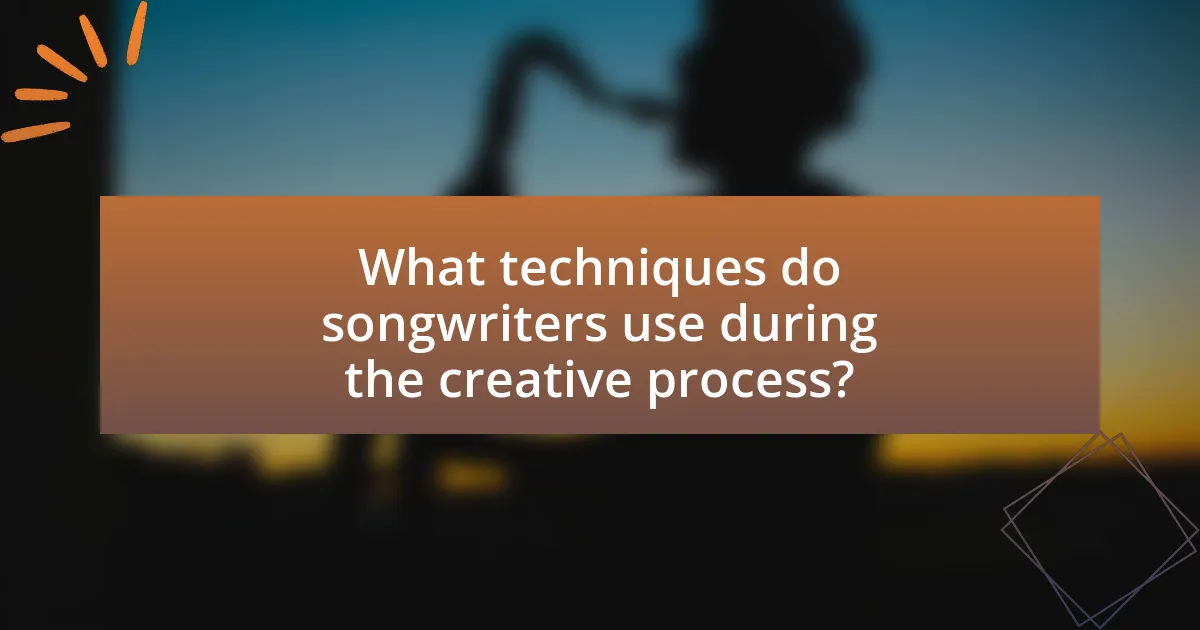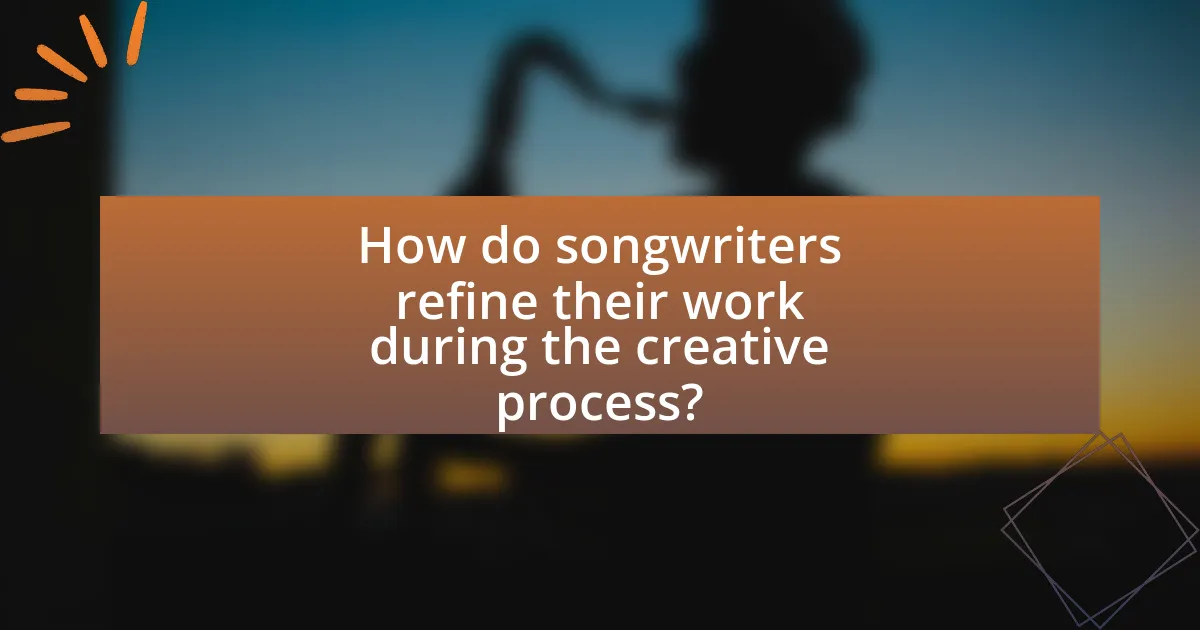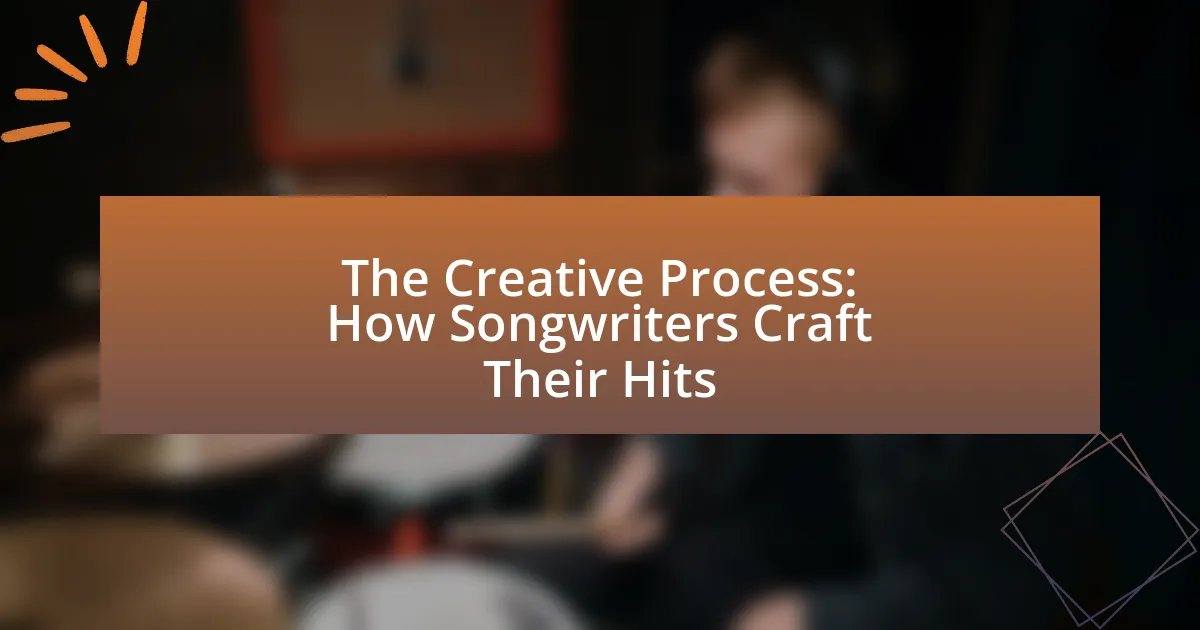The article focuses on the creative process that songwriters employ to craft their hits, detailing the structured steps involved in transforming musical ideas into complete songs. It outlines key stages such as idea generation, lyric writing, melody composition, arrangement, and revision, emphasizing the importance of personal experiences and collaboration in enhancing creativity. Additionally, the article discusses various techniques and tools that assist songwriters, the role of feedback in refining their work, and best practices for aspiring songwriters to develop their unique voice and style. Overall, it provides a comprehensive overview of how songwriters navigate their artistic journey to produce impactful music.

What is the Creative Process in Songwriting?
The creative process in songwriting involves a series of structured steps that songwriters follow to develop their musical ideas into complete songs. This process typically includes brainstorming concepts, writing lyrics, composing melodies, arranging music, and refining the final product. Research indicates that successful songwriters often utilize techniques such as free writing, collaboration, and iterative feedback to enhance their creativity and output. For instance, a study published in the Journal of Creative Behavior highlights that collaboration can lead to more innovative songwriting outcomes, as diverse perspectives contribute to richer musical ideas.
How do songwriters define their creative process?
Songwriters define their creative process as a structured yet flexible approach that involves inspiration, composition, and revision. This process typically begins with the generation of ideas, which can stem from personal experiences, emotions, or observations. Following this, songwriters often engage in crafting melodies and lyrics, utilizing techniques such as brainstorming and free writing to explore different themes and structures.
Research indicates that many successful songwriters emphasize the importance of collaboration, often working with other musicians to enhance creativity and refine their work. For instance, a study published in the Journal of Creative Behavior highlights that collaborative songwriting can lead to more innovative outcomes compared to solo efforts. This collaborative aspect, combined with iterative revisions, allows songwriters to hone their craft and produce polished final products.
What stages are involved in the songwriting process?
The songwriting process involves several key stages: idea generation, lyric writing, melody composition, arrangement, and revision. In the idea generation stage, songwriters brainstorm themes or concepts, often inspired by personal experiences or emotions. During lyric writing, they craft the words that convey the song’s message, focusing on rhyme and rhythm. The melody composition stage involves creating a musical tune that complements the lyrics, often using instruments or vocalization. Arrangement follows, where songwriters structure the song, deciding on verses, choruses, and bridges. Finally, revision is crucial, as songwriters refine the lyrics and melody, ensuring coherence and emotional impact. Each stage is essential for producing a polished and engaging song.
How do personal experiences influence songwriting?
Personal experiences significantly influence songwriting by providing authentic emotional content and relatable narratives. Songwriters often draw from their own life events, relationships, and struggles, which allows them to create songs that resonate deeply with listeners. For example, Taylor Swift frequently incorporates her personal relationships and experiences into her lyrics, resulting in songs that connect with a wide audience due to their emotional honesty. Research indicates that songs based on personal experiences tend to evoke stronger emotional responses from listeners, enhancing the song’s impact and memorability.
Why is the creative process important for crafting hits?
The creative process is crucial for crafting hits because it allows songwriters to explore innovative ideas and refine their artistic expression. This iterative process involves brainstorming, experimentation, and revision, which leads to the development of unique melodies and lyrics that resonate with audiences. Research indicates that songs that undergo extensive creative development often achieve higher commercial success, as seen in the Billboard charts, where many top hits are products of collaborative writing sessions that emphasize creativity and adaptability.
What role does creativity play in songwriting success?
Creativity is essential for songwriting success as it enables songwriters to produce original and engaging content that resonates with listeners. Originality in lyrics, melodies, and arrangements distinguishes successful songs from others, allowing them to capture audience attention and evoke emotional responses. Research indicates that songs with unique and innovative elements tend to perform better on charts, as they stand out in a saturated market. For instance, a study published in the Journal of Popular Music Studies highlights that creative songwriting techniques, such as metaphor and narrative structure, significantly enhance listener engagement and memorability, contributing to a song’s commercial success.
How can understanding the creative process improve songwriting skills?
Understanding the creative process can significantly improve songwriting skills by providing a structured approach to idea generation and refinement. When songwriters comprehend the stages of creativity—such as preparation, incubation, illumination, and verification—they can effectively navigate their artistic journey, leading to more cohesive and impactful songs. Research indicates that songwriters who actively engage in these stages are more likely to produce work that resonates with audiences, as they can better harness their emotions and experiences into their lyrics and melodies. For instance, a study published in the Journal of Creative Behavior found that musicians who utilized a systematic approach to creativity reported higher satisfaction and success in their songwriting endeavors.

What techniques do songwriters use during the creative process?
Songwriters use various techniques during the creative process, including brainstorming, free writing, and collaboration. Brainstorming allows songwriters to generate a wide range of ideas and themes, often leading to unique lyrical concepts. Free writing encourages spontaneous expression, helping to overcome writer’s block and discover new melodies or phrases. Collaboration with other musicians or songwriters can enhance creativity by combining different perspectives and skills, resulting in richer compositions. These techniques are widely recognized in songwriting literature, such as in “Writing Better Lyrics” by Pat Pattison, which emphasizes the importance of structured creativity in songwriting.
How do songwriters generate ideas for their songs?
Songwriters generate ideas for their songs through various methods, including personal experiences, observations of the world around them, and emotional responses to events. They often draw inspiration from their own lives, relationships, and struggles, which allows them to create relatable content. Additionally, songwriters may utilize prompts, such as specific themes or concepts, to spark creativity. Research indicates that collaboration with other artists can also enhance idea generation, as diverse perspectives can lead to innovative concepts. For instance, a study published in the Journal of Creative Behavior highlights that brainstorming sessions among songwriters often result in a higher quantity and quality of ideas compared to solo writing.
What methods do songwriters use for brainstorming lyrics?
Songwriters use various methods for brainstorming lyrics, including free writing, mind mapping, and collaborative sessions. Free writing allows songwriters to generate ideas without self-censorship, often leading to unexpected phrases and themes. Mind mapping visually organizes thoughts and concepts, helping to explore connections between ideas. Collaborative sessions involve working with other songwriters or musicians, which can spark creativity through shared perspectives and feedback. These methods are effective as they encourage spontaneity and exploration, essential elements in the songwriting process.
How do melodies and harmonies come into play during idea generation?
Melodies and harmonies play a crucial role in idea generation by providing a framework for emotional expression and thematic development in songwriting. Melodies serve as the primary vehicle for conveying a song’s message, often evoking specific feelings that inspire further creative exploration. Harmonies complement melodies by adding depth and complexity, enhancing the emotional impact and guiding the songwriter’s direction. Research indicates that the interplay between melody and harmony can stimulate cognitive processes associated with creativity, allowing songwriters to generate innovative ideas more effectively. For instance, studies have shown that engaging with different harmonic structures can lead to novel melodic ideas, thereby enriching the creative process.
What tools and resources assist songwriters in their creative process?
Songwriters utilize various tools and resources to enhance their creative process, including digital audio workstations (DAWs), songwriting apps, and collaborative platforms. DAWs like Ableton Live and Logic Pro provide comprehensive environments for composing, recording, and producing music, allowing songwriters to experiment with sounds and arrangements efficiently. Songwriting apps such as Songwriter’s Pad and Evernote help organize lyrics and ideas, facilitating the brainstorming process. Additionally, collaborative platforms like Splice enable songwriters to connect with other musicians, share ideas, and access a library of sounds and samples, fostering creativity through collaboration. These tools collectively streamline the songwriting process, making it more accessible and efficient for artists.
Which software and apps are popular among songwriters?
Popular software and apps among songwriters include Ableton Live, Logic Pro, and GarageBand. These tools are widely used for their robust features that facilitate music production, arrangement, and recording. For instance, Ableton Live is favored for its intuitive interface and live performance capabilities, while Logic Pro offers advanced MIDI editing and a vast library of sounds. GarageBand is often recommended for beginners due to its user-friendly design and accessibility on Apple devices. These applications are essential in the songwriting process, enabling artists to create, edit, and produce music efficiently.
How do collaboration and feedback enhance the songwriting process?
Collaboration and feedback significantly enhance the songwriting process by introducing diverse perspectives and constructive criticism. When songwriters collaborate, they combine their unique skills and ideas, leading to innovative melodies and lyrics that may not emerge in isolation. For instance, a study published in the Journal of Creative Behavior found that collaborative songwriting often results in higher-quality compositions due to the pooling of creative resources and the ability to refine ideas through group input. Feedback from peers allows songwriters to identify strengths and weaknesses in their work, fostering improvement and encouraging experimentation. This iterative process of sharing and revising ultimately leads to more polished and impactful songs.

How do songwriters refine their work during the creative process?
Songwriters refine their work during the creative process by revising lyrics, melodies, and arrangements based on feedback and self-assessment. This iterative process often involves recording demos, sharing them with trusted collaborators, and making adjustments to enhance emotional impact and clarity. For instance, a study by the University of Southern California found that songwriters frequently engage in peer reviews, which can lead to significant improvements in the final product. Additionally, many successful songwriters utilize tools like lyric analysis and melody mapping to identify areas for enhancement, ensuring their songs resonate with audiences.
What strategies do songwriters use for editing and revising their songs?
Songwriters use several strategies for editing and revising their songs, including feedback solicitation, structural analysis, and lyrical refinement. Feedback solicitation involves sharing drafts with trusted peers or mentors to gain diverse perspectives, which can highlight areas for improvement. Structural analysis focuses on examining the song’s form, ensuring that verses, choruses, and bridges flow cohesively and maintain listener engagement. Lyrical refinement entails scrutinizing word choice, rhythm, and rhyme schemes to enhance emotional impact and clarity. These strategies are supported by the practice of iterative revisions, where songwriters often revisit and modify their work multiple times, leading to a polished final product.
How important is feedback from peers in the revision stage?
Feedback from peers in the revision stage is crucial for songwriters as it enhances the quality of their work. Peer feedback provides diverse perspectives that can identify strengths and weaknesses in a song, leading to more refined and impactful lyrics and melodies. Research indicates that collaborative feedback can significantly improve creative outputs; for instance, a study published in the Journal of Creative Behavior found that peer reviews often lead to higher-quality revisions compared to solitary efforts. This collaborative process not only fosters creativity but also helps songwriters align their work with audience expectations, ultimately increasing the likelihood of a hit song.
What common pitfalls do songwriters face during refinement?
Songwriters commonly face several pitfalls during the refinement stage, including over-editing, losing original intent, and neglecting feedback. Over-editing can lead to a loss of spontaneity and emotional impact, as songwriters may become too focused on technical perfection rather than the song’s essence. Losing original intent occurs when songwriters alter their work excessively, straying from the initial inspiration that sparked the creation. Additionally, neglecting feedback from trusted peers or collaborators can result in a lack of perspective, preventing songwriters from identifying areas that need improvement or enhancement. These pitfalls can hinder the overall quality and authenticity of the final song.
How do songwriters know when a song is ready for release?
Songwriters know a song is ready for release when they feel it effectively conveys the intended emotion and message, and resonates with their target audience. This readiness is often assessed through feedback from trusted peers, producers, or test audiences, which can provide insights into the song’s impact. Additionally, songwriters may evaluate the song’s production quality, lyrical coherence, and overall arrangement to ensure it meets industry standards. The decision is also influenced by market trends and the songwriter’s personal intuition, which can guide them in determining if the song aligns with current listener preferences.
What criteria do songwriters use to evaluate their final product?
Songwriters evaluate their final product based on criteria such as lyrical coherence, melody, emotional impact, originality, and marketability. Lyrical coherence ensures that the song’s message is clear and resonates with listeners, while melody contributes to the song’s catchiness and memorability. Emotional impact is crucial as it connects the audience to the song, often determining its success. Originality distinguishes a song from others in the market, and marketability assesses its potential for commercial success. These criteria are supported by industry standards and feedback from listeners and music professionals, which highlight the importance of these elements in creating successful songs.
How does the creative process differ between genres?
The creative process differs between genres primarily due to varying conventions, audience expectations, and thematic elements. For instance, in pop music, songwriters often prioritize catchy hooks and relatable lyrics to appeal to a broad audience, while in genres like jazz, improvisation and complex musical structures take precedence, allowing for more personal expression and experimentation. Additionally, country music frequently emphasizes storytelling and emotional narratives, which shapes the songwriting approach to focus on lyrical depth and character development. These genre-specific characteristics dictate not only the structure and style of the music but also the techniques and tools employed by songwriters, such as the use of specific chord progressions or lyrical motifs that resonate with the intended audience.
What are some best practices for aspiring songwriters?
Aspiring songwriters should consistently write and refine their songs to develop their craft. Regular practice helps in honing lyrical skills and melody creation, which are essential for songwriting. Additionally, studying successful songs and understanding their structure can provide valuable insights into effective songwriting techniques. Collaborating with other musicians can also enhance creativity and introduce new perspectives. Engaging in feedback sessions with peers or mentors allows songwriters to gain constructive criticism, which is crucial for improvement. Lastly, maintaining a journal for ideas and inspirations can serve as a resource for future songwriting endeavors.
How can songwriters develop their unique voice and style?
Songwriters can develop their unique voice and style by consistently experimenting with different genres, lyrical themes, and musical structures. This experimentation allows them to discover what resonates with their personal experiences and artistic vision. For instance, artists like Bob Dylan and Joni Mitchell have famously blended folk, rock, and personal storytelling, which helped them carve out distinct identities in music. Additionally, analyzing influences and incorporating elements from various artists can further refine a songwriter’s style, as seen in the works of contemporary musicians who draw inspiration from diverse sources while maintaining originality.
What daily habits can enhance a songwriter’s creative process?
Daily habits that can enhance a songwriter’s creative process include setting aside dedicated time for writing, engaging in regular listening to diverse music genres, and maintaining a journal for ideas and lyrics. Establishing a routine for songwriting fosters discipline and consistency, which are crucial for creativity. Research indicates that exposure to various musical styles can inspire new ideas and techniques, enhancing originality in songwriting. Additionally, journaling helps capture fleeting thoughts and emotions, serving as a valuable resource for lyrical content.
